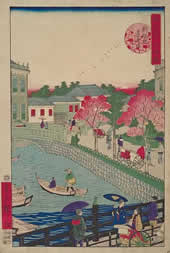AMERICA, ASIA AND THE PACIFIC
The Edward Sylvester Morse Collection, from the Phillips Library at the Peabody Essex Museum, Salem
Further information on this digital resource can be found on our website www.amdigital.co.uk.
Edward S Morse (1838-1925) was a great polymath – notable for his work in natural history, ethnography and art history – but, perhaps most famous for his work in bringing Japan and the West closer together.
He was one of the first Americans to live in Japan – teaching science at the Imperial University of Tokyo – and he devoted much of his life to the task of documenting life in Japan before it was transformed by Western modernization. In addition to preserving the household records of a samurai family and many accounts of the tea ceremony, Morse made notes on subjects as diverse as shop signs, fireworks, hairpins, agricultural tools, artists’ studios, music, games, printing, carpentry, the Ainu, gardens, household construction, art and architecture.
An accomplished draughtsman, his pencil and ink drawings, enliven his diaries and correspondence and make his papers a pleasure to read. The papers include:
- His original Japan diaries, which run to over 3,000 pages and contain over 1,300 sketches.
- Journals of visits to England, France and Germany in the 1880s showing the interest of Europeans in gaining authentic insights into ordinary life in Japan and China.
- Correspondence including exchanges with Alexander and Louis Agassiz, William Sturgis Bigelow, Charles Darwin, Ernest Fenollosa, Yukichi Fukuzawa, Isabella Stewart Gardner, John M Gould, Oliver Wendell Holmes, Ernest Ingersoll, Hiroyuki Kato, Percival Lowell, The Museum of Fine Arts in Boston, Charles Eliot Norton, Frederick Putnam, Hideo Takamine, Seiichi Tejima, Charles Townsend, Charles Weld and Yu Kil-chun.
- Scrapbooks with a wealth of rare and ephemeral material on myriad subjects.
- Records of his publications and lectures revealing his interests in archaeology, art, astronomy, ethnology, religion and zoology, as well as his desire to encourage an American audience to appreciate Asian society and culture.
- Morse was one of the earliest and most important mediators between American and Asian societies. It is fitting that his papers should now enable scholars to explore these links.
|

|















